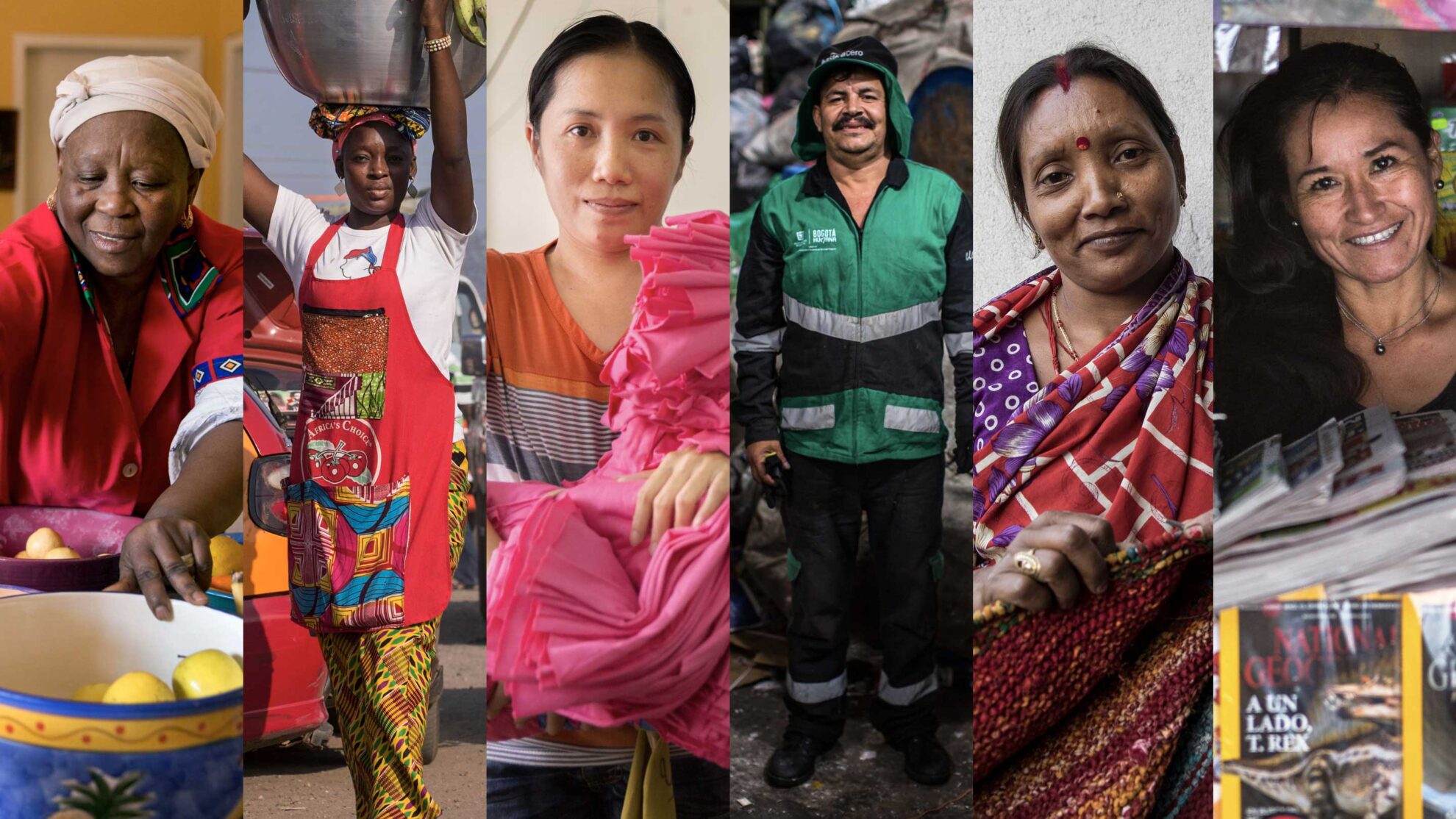"We're here to discuss one of the most profound challenges of our time—how to create jobs, how to increase incomes, and how to improve working conditions in today's globalized economy."
That’s how WIEGO’s International Coordinator, Sally Roever, introduced a public dialogue on formalizing the informal economy in South Africa. "It's a challenge not only here in South Africa ... it's a challenge all over the world and throughout the 41 countries represented in this room," Sally said at the November 2018 event. "Today we approach the challenge from the standpoint of workers in the informal economy."
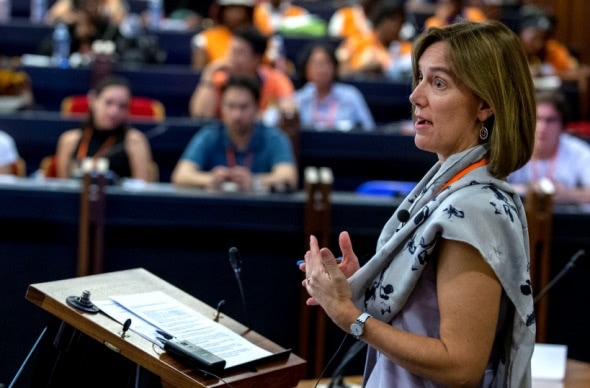
Held at the University of the Witwatersrand (Wits) in Johannesburg, the Public Dialogue on Forging a Path towards Recognition and Inclusion of Informal Workers featured informal worker leaders, experts on informal economy issues and government representatives involved in implementing ILO Recommendation 204 (R204) on the Transition from the Informal to the Formal Economy in South Africa.
Sally recalled the International Labour Conference (ILC) in 2015 where Recommendation 204 on Formalizing the Informal Economy was discussed and adopted. Over 30 informal worker delegates attended that ILC. One of those delegates stood and said, “You are talking about us. We are real people, and we are here.”
In talking about formalization in South Africa, Sally emphasized, it must be remembered that during the long process that led to R204, informal workers were there—organizing, advocating and building unity.
“We all know that change doesn’t happen overnight,” she said. “What is clear is that creating space for informal workers to be represented at the table, in every part of the process, right from the beginning, was fundamental. Informal workers are real people—and they are here.”
Addressing Inequalities
In his gracious welcoming remarks, Wits University Vice-Chancellor Adam Habib, noted: “If we're going to be serious about surviving as a species in the next 100 years, we must come together as a community. We must build bridges and address inequalities.”
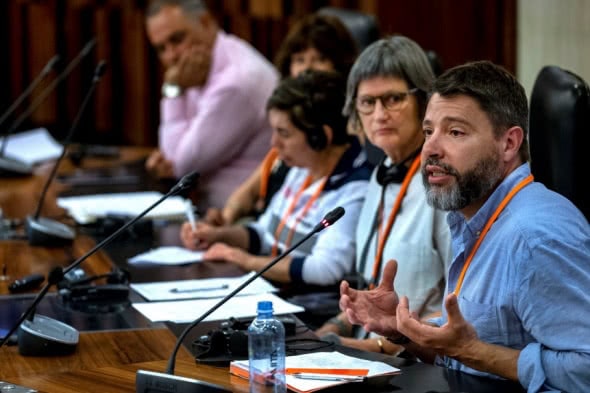
"If we’re to get to inequality in how societies are structured," Michael Rogan, a Research Associate for WIEGO based in South Africa, said, "we need to know about the informal economy and what it contributes…. We now know that most workers in the world are informal."
He spoke to the statistical realities of the informal economy and reiterated the new global estimates: that 61 per cent of the world’s workforce, some two billion workers, are informal.
“I can’t think of a better argument to suggest that globally, the informal economy is the real economy,” he told the audience. “It’s a very powerful statistic to take forward in your own context. When we talk about the future of work, when we talk about employment … informal workers are the majority.”
Mike noted that in South Africa, a third of the entire workforce is informal, adding that South Africa’s statistical office is very transparent and rigorous, and uses guidelines consistent with ILO guidelines. Using the latest of those reliable statistics, Mike had determined that the informal economy was larger than the agricultural, mining, manufacturing, construction, utilities and transport sectors combined.
The numbers, he said, also reveal the highly gendered differences within the informal workforce:
- 64 per cent of informal workers are employees, including over 1 million domestic workers; private household workers are the lowest earning group among informal workers, and 80 per cent of these are women
- 28 per cent are own account workers who work for themselves (street vendors and waste pickers, for example)
- 7 per are employers – they are the highest earning group among South Africa’s informally employed—and 90 per cent are men.
“And in every segment within the informal economy, men earn significantly more than women on average, in the same types of work,” he concluded.
Examining the Existing Laws
Pat Horn, founder of StreetNet International and moderator for the event, explained that existing law is written in a way that does not allow informal worker organizations to identify themselves as trade unions. "In South Africa … our Constitution states that all workers have the right to form unions and to take part in collective bargaining. But our labour legislation only refers to employees, so it deliberately excludes workers who don’t have an employer."
WIEGO’s Law Programme Director, Marlese von Broembsen, echoed those concerns. "There’s a job to be done in terms of an ideological shift, in this country and around the world, in the idea of collective bargaining for informal workers."
Marlese is a technical advisor on legal issues to the Law Reform Committee, a subcommittee of South Africa’s R204 task team. She explained that while South Africa’s Labour Relations Act (which regulates collective bargaining) previously excluded domestic workers and farm workers, among others, the new Act of 1994 very specifically includes all workers. “It sets up seven presumptions of employment,” she said. “A worker just has to allege one of those seven and the employer has to show that the presumption is not true.”
However, she asserted, the problem is non-compliance. Education is required to ensure workers know their rights as well as what avenues are available if their rights are being violated. Employers, meanwhile, need to know their responsibilities.
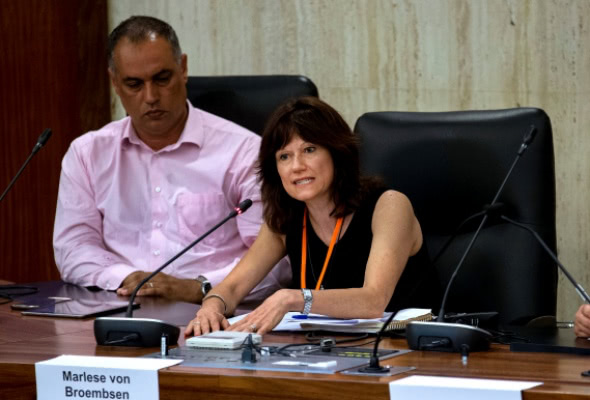
“I’m not sure employers of domestic workers always know that they are compelled by law to complete a contract, for example, or register with the unemployment insurance fund,” she said.
Enforcement is a second challenge. She explained there’s no fine for non-compliance, and in many cases there are no workplace inspections.
Marlese outlined the kinds of labour law reform that were needed to ensure all workers, not just employees, could engage in collective bargaining. But that will require shifts not just in legal language, but in identifying who the bargaining partners will be in each context, while avoiding unintended consequences in fashioning laws.
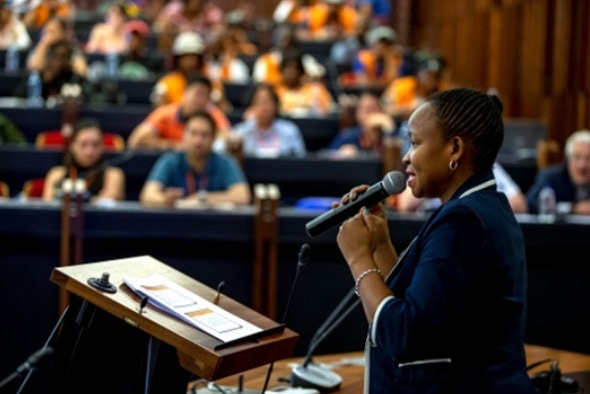
According to Lufuno Tinyani from the Department of Labour, examining the existing laws in South Africa with an eye to what amendments are needed to create an enabling regulatory and policy environment is a priority.
A member of the National Task Team charged with planning and implementing R204, she offered an overview of the Task Team’s work to date and pointed to one particularly significant achievement: a national dialogue that brought together stakeholders from communities across the country in March 2018. That dialogue led to the establishment of a sub-committee to look at the existing laws and make recommendations. Other goals established through the dialogue include measuring informality and strengthening the capacity of informal workers and their economic units, as well as government at all levels.
Charles Parkerson, Director of Economic Development for the South African Local Government Association (SALGA), also spoke to matters of law, noting that it’s critical for SALGA’s 237 member municipalities to understand what the jurisprudence says, “so municipalities can be on the right side of the law.”
To this end, SALGA is developing materials to offer guidelines around policies and laws. He said that SALGA will work with informal workers and their allies so that municipalities implement appropriate policies and by-laws.
Informal Workers Speak
Sitting at the national task team, opposite the national government—many departments—made us feel very important. They listened closely. We participated, gave our challenges, but we are reflecting: at 2018, what has been done now? We cannot say much. Therefore, the slow pace of implementation is our biggest issue.
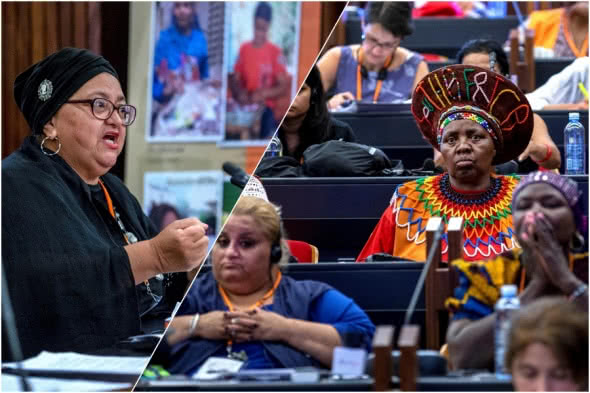
Rosheda Muller, a long-time street trader (and a home-based worker) in Cape Town is President of the South African Informal Traders Association (SAITA). She has had a seat at the table to discuss the road map for implementing R204 in South Africa.
Now, she says, the wait for implementation has gone on too long.
“The workforce needs to start pushing and putting more pressure to ensure that the movement of implementation is faster.”
She passionately detailed why informal workers are fighting for R204. “We are harassed with areas that are not suitable…. There are no toilets for our workers in their work spaces. There are no child care facilities. Crime festers in our work spaces,” she said. “We are tired of being grouped as criminals. We are being criminalized as workers, yet as statistics have shown, we are the biggest workforce in the world.”
Rosheda listed things that informal workers need: security of tenure, an enabling environment, access to proper infrastructure, and social protection among them.
“We have presented our provincial leadership with demands that are no different than what is in R204.”
The Public Dialogue coincided with International Street Trader Day and indeed, the slogan of street vendors worldwide— “Nothing for us without us!”—was a dominant theme throughout the discussion. It was invoked both by panelists and by members of the audience during the lively discussion that ensued.
Simon Mbata, the National Coordinator for the South African Waste Pickers Association (SAWPA), is also part of the extended task team. He wants to ensure that waste pickers all over South Africa are recognized – in terms of the economy, in terms of the environment and as people with enterprises.
"We have worked very hard in trying to change the mindset of the formal sector, because even government didn’t believe that the experience, the willingness and the know-how existed among the informal sector to say how we could be part of the system," he said.
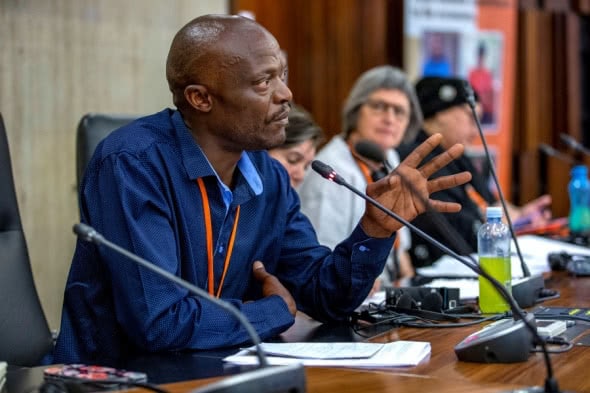
He said he prefers to speak of integration rather than formalization, because he worries the latter will slot waste picking as just one kind of work when it has two sides. Waste pickers, he emphasized, both provide services by gathering and separating waste, but they are also entrepreneurs who sell their material.
“Waste pickers find themselves in one of the richest industries in the world. There are a lot of business opportunities,” Simon said. “We want to see them benefitting in the whole value chain.” For that reason, SAWPA is working with both industry and government, to ensure that transformation occurs. One significant demand is for regulation of the erratic market price of recyclable materials.
Implementation of R204 is a national policy, but Simon noted that it has to speak to local government. “We emphasized that there’s a need for guidelines that come from national government to make sure that all municipalities are on the same page in terms of waste pickers being part of the waste management system,” Simon said. If all municipalities draft their own policies, he fears waste pickers “could win and lose at the same time.”
While the focus of this event was firmly on South Africa, Nohra Padilla, a waste picker leader from Colombia and one of the international panellists who brought their perspectives to the discussion, confirmed that the experiences of South Africa’s informal workers was shared in many countries of the world. Similar to what Rosheda said about street vending, Nohra noted that waste picking in many places is also often criminalized.
"It is important to recognize this sector as it contributes to the well-being and wealth," she said. "But the wealth goes to the hands of the rich."
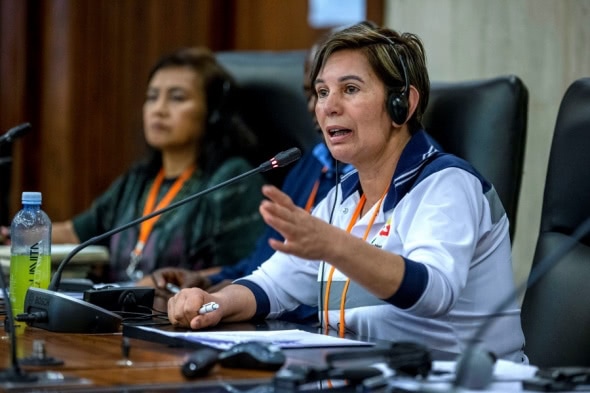
Suntaree Saeng-ging from HomeNet Thailand also offered an international perspective, detailing the many gains that informal workers in Thailand have achieved through their concentrated efforts—including recent gains in social protection
“R204 is another tool,” she said, “that we can use to pressure our governments.”
